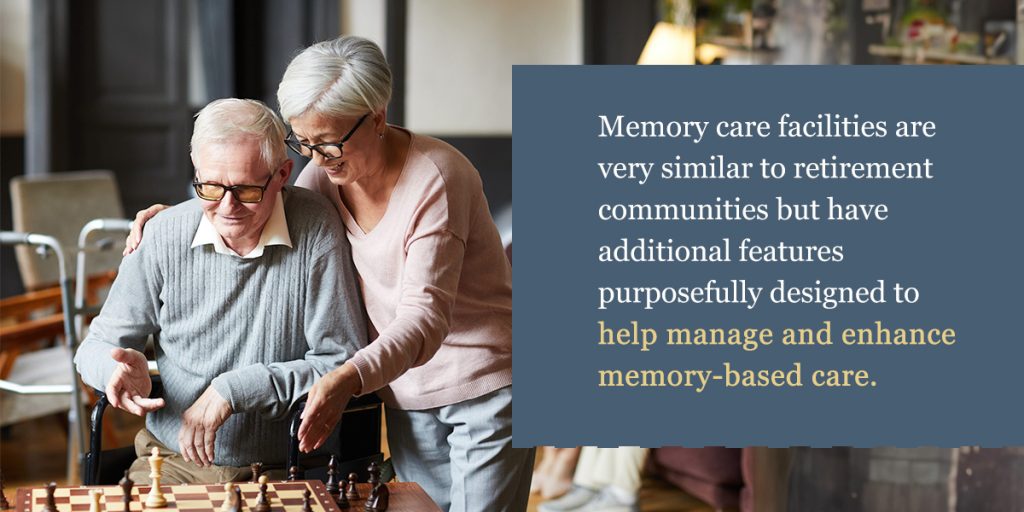
Memory care is a person-first method of caring for individuals experiencing Alzheimer’s, dementia or other memory-related conditions. Memory care is designed to provide an engaging environment while being structured and safe for residents. Learn more about memory care below, such as what memory care includes, the benefits it offers and what to expect in terms of cost.
Contents:
If your loved one faces challenges with their memory or cognitive abilities, professional memory care could be just what they need to enjoy a safer, more supportive lifestyle — and just what you need for peace of mind. Memory care offers the following benefits:
Individuals experiencing memory loss may be prone to wandering or getting lost. Memory care facilities include 24-hour security features, such as:
For your loved one, this means more intentional care and a smaller risk of injury or getting lost. For you, it’s added peace of mind knowing your loved one is safe and secure in a facility designed specifically for their needs.
Memory-based conditions can quickly change and evolve — it helps to have the same team of caring professionals overseeing your loved one’s memory care plan. Your loved one can count on facility staff to be an active part of their daily life, often working alongside nurses or doctors to ensure the best results.
Caregivers who specialize in memory care undergo additional training to assist with acts of daily living (ADLs). They’re also equipped with skills to help your loved one communicate their wants and needs clearly and are armed with the knowledge of what to do if that communication fails.
Memory care often includes access to cognitively stimulating amenities, such as:
These amenities let your loved one do more than manage their memory condition — they help them thrive and enjoy a renewed sense of fun and purpose.
Caregiving is an emotionally and physically taxing responsibility, and the challenges associated with Alzheimer’s and dementia are often too complex or significant for one person to handle alone. Consider these statistics from the Alzheimer’s Association:
Professionally coordinated care at a memory care facility helps alleviate these burdens and lends a much-needed helping hand. Caregivers are still an active part of their loved one’s life and a vital component of their well-being — but with the help of a memory care facility, you can find relief that you are not alone.

Memory care facilities cater specifically to individuals living with Alzheimer’s, dementia and similar conditions that impact memory. They are very similar to retirement communities but have additional features purposefully designed to help manage and enhance memory-based care, such as:
Though they do not provide the same level of medical care as a nursing home, memory care staff are trained to empathize with, anticipate and manage the unique challenges associated with cognitive impairment, such as memory loss, mood swings and emotional reactivity.
Individuals are typically charged on a monthly basis, and prices vary between facilities. The average monthly cost for memory care generally costs 20% to 30% more than an assisted living facility would in the same area. For perspective, the monthly median cost of assisted living facilities in the U.S. was $4,500 in 2021.
What is included in memory care depends on things like the facility’s location, amenities, specialized care offerings and whether your loved one lives alone or with a roommate. These factors also influence the total expense.
Most memory care facilities include the following with their base charge:
Memory care is an investment in your loved one’s well-being, and it may pay off in the long term. According to the Alzheimer’s Association, interprofessional memory care clinics can help reduce per-person medical costs by more than $3,400 over the course of a year compared to those who are only seen by a primary care physician.
Memory care and assisted living facilities are both noninstitutional and share some similarities, but they serve different functions at their core. While both are staffed by trained caregivers, those at memory care facilities provide more around-the-clock, hands-on care than staff at an assisted living facility. Care tasks are often more person-centered at memory care facilities, focusing on the individual’s unique needs and challenges. Memory care teams are specifically trained to manage Alzheimer’s and dementia symptoms while promoting independence. Assisted living facilities are meant to accommodate individuals without a memory condition or those in the early stages of one who need assistance with ADLs.
The facilities themselves are also different — memory care units are designed with specific layouts, color themes and other features to help residents stay oriented and minimize confusion or over-stimulation. This might include a color-coding system and clear boundaries around certain common areas. The facility’s amenities and programs are also different. While assisted living communities offer similar clubs, groups and social events, memory care units cater these amenities to those with cognitive impairment. Programs are more individually focused with an emphasis on keeping the mind engaged. Both types of facilities are state-licensed and inspected to meet certain quality and safety standards.
Memory care facilities may have additional services or amenities, depending on the location and your loved one’s budget. For example, some are licensed to dispense medication, while others can only issue medication reminders. Some facilities house multiple units within one, such as an assisted living community with a separate memory care unit. Be sure to ask questions and research potential options to make sure the place you choose is the best fit for your loved one’s needs.
Elm Terrace is a non-profit retirement living community and nursing home in Lansdale, Pennsylvania, with three health care options — personal care, skilled nursing and rehabilitation, and memory care. We take a person-first approach, understanding that every person who walks through our doors has their own sets of concerns, needs, health challenges and goals. We will work with you to develop a resident care plan that supports your loved one’s cognitive impairment while promoting independence, movement and active engagement in our thriving community.
Residents love our carefully curated amenities, including beautiful gardens, fitness areas, chef-prepared meals, beauty and barbershops, and a variety of on-site options like a post office and convenience store.
Give us a call at 215-361-5600 or contact us online to learn more about our offerings and how we can help your loved one find a renewed sense of comfort and vitality.
